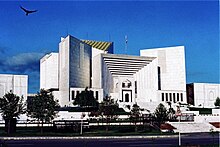
Back পাকিস্তানের প্রধান বিচারপতি Bengali/Bangla Juge en chef du Pakistan French पाकिस्तान के मुख्य न्यायाधीश Hindi چیف جسٹس پاکستان PNB پاڪستان جو چيف جسٽس Sindhi Chief Justice of Pakistan SIMPLE منصف اعظم پاکستان Urdu
| Chief Justice of Pakistan | |
|---|---|
| منصفِ اعظم پاکستان Munsif-e-Āzam Pākistān قاضیُ الْقُضاۃ | |
 Emblem of the SCP | |
since 26 October 2024 | |
| Supreme Court of Pakistan | |
| Style | The Honorable (formal) Your Lordship (within court) Mr. Chief Justice (informal) |
| Status | Chief justice |
| Seat | Supreme Court Building, Red Zone, Islamabad |
| Nominator | Prime Minister of Pakistan on recommendations of Special Parliamentary Committee. |
| Appointer | President of Pakistan |
| Term length | 3 Years or (until the age of 65) whichever is earlier |
| Constituting instrument | Constitution of Pakistan |
| Formation | 27 June 1949 |
| First holder | Abdul Rashid (as Federal Chief Justice) |
| Website | www |

The chief justice of Pakistan (initials as CJP; Urdu: منصفِ اعظم پاکستان, Munsif-e-Āzam Pākistān) is the chief judge of the Supreme Court of Pakistan and is the highest-ranking officer of the Pakistani judiciary.[1]
The Federal Court of Pakistan was established by Governor-General Jinnah's Order in February 1948. Until 1956, the chief justice and senior justices were known by the title of 'Federal Judge', and the Federal Court of Pakistan operated out of a wing of the Lahore High Court, despite the federal capital's location in Karachi. The enactment of Pakistan's first constitution in March 1956 redesigned it as the 'Supreme Court of Pakistan.' [2]
The chief justice is the chief administrative officer of the country's court system and the highest judicial officer, ranking immediately above the chief justice of the Federal Shariat Court. He is responsible for supervising federal judicial policies, and conducting judicial business in the Supreme Court.[3][4]
Nomination for the appointment of the chief justice is made by the prime minister of Pakistan, and final appointments are confirmed by the president of Pakistan.[5][6] Chief Justice of Pakistan is recommended by Special Parliamentary Committee consisting of 8 members of National Assembly and 4 members of Senate.He is selected by amongst 3 senior most justices of Supreme Court by two third majiority of total membership of Committee. Committee sends nomination of selected justice to Prime Minister and Prime Minister advises President of Pakistan to appoint that justice as Chief Justice of Supreme Court of Pakistan.
Before 26th Amendment to the Constitution 2024. Senior most judge of Supreme Court was appointed as Chief Justice by President on advice of Prime Minister.
Presiding over the oral arguments before the court, the chief justice has significant agenda-setting power over meetings of the Supreme Court. In modern tradition[clarification needed], the chief justice has the ceremonial duty of administering the oath of office of the president of Pakistan.[7]
The first chief justice was Sir Abdul Rashid.[8][9] The current chief justice is Yahya Afridi, incumbent since 26 October 2024.
- ^ Pakistan Business Law Handbook Strategic Information and Laws. Intl Business Pubns USA. 2012. ISBN 978-1438770710. Retrieved 19 April 2015.[permanent dead link]
- ^ Shah, Ralph Braibanti (1999). Chief Justice Cornelius of Pakistan : an analysis with letters and speeches. Foreword by Nasim Hasan (2. impr. ed.). Oxford: Oxford University Press. ISBN 9780195790184.
- ^ Article 176 in The Judicature Chapter 2 of Part VII of the Constitution of Pakistan
- ^ Article 175A in Chapter 1: The Courts. Part VII: The Judicature of the Constitution of Pakistan
- ^ Article 175A(12)-175A(13) Chapter 1: The Courts. Part VII: The Judicature of the Constitution of Pakistan
- ^ "Judges Appointment & Court Composition". Islamabad, Pakistan: Supreme Court of Pakistan Press. Archived from the original (google cache (html)) on 24 March 2015. Retrieved 19 April 2015.
- ^ Article 178 in the Chapter 2: The Supreme Court of Pakistan of Part VII: The Judicature of Constitution of Pakistan
- ^ Masood, Ahsan. "Names of the Chief Justices of the Supreme Court of Pakistan". Masood and Masood Press. Archived from the original on 17 December 2014. Retrieved 19 April 2015.
- ^ "The Judicial System of Pakistan" (PDF). Supreme Court of Pakistan. Archived from the original (PDF) on 6 February 2017. Retrieved 13 January 2019.